"This Decision Saved Me": How to Find the Motivation to Make a Big Life Change

"Hearst Magazines and Yahoo may earn commission or revenue on some items through the links below."
Welcome to the Great Reimagination! From small improvements to life-altering decisions, the country is in a profound period of change. You may have heard of the Great Resignation, but we prefer to look at this new era as an opportunity to truly choose your own future. As you explore our Great Reimagination series, get inspired to let 2022 be the year you dream big.
Deepak Chopra once said, "All great changes are preceded by chaos," and he might as well have been talking specifically about the last couple of years, which have been nothing if not unprecedented, historic and, yes, chaotic. Many of us used that period of uncertainty and anxiety to ask ourselves the big questions: Do I love my job? Should I relocate? Am I happy? We asked more than a dozen people from across the country to share the details of their own "Great Reimaginations," including a leap from a big business to a small one (and back again), a new approach to finding love, the difficult decision to go to rehab and more.
Their answers, recorded below after a series of intimate interviews, reveal the inner workings of people destined for great things: a more rewarding career, a sense of peace in a new place, a loving partnership. Whether you're contemplating a big change or a small one, these stories may inspire you to look at life a little differently.
"I went back to law school in my 60s."
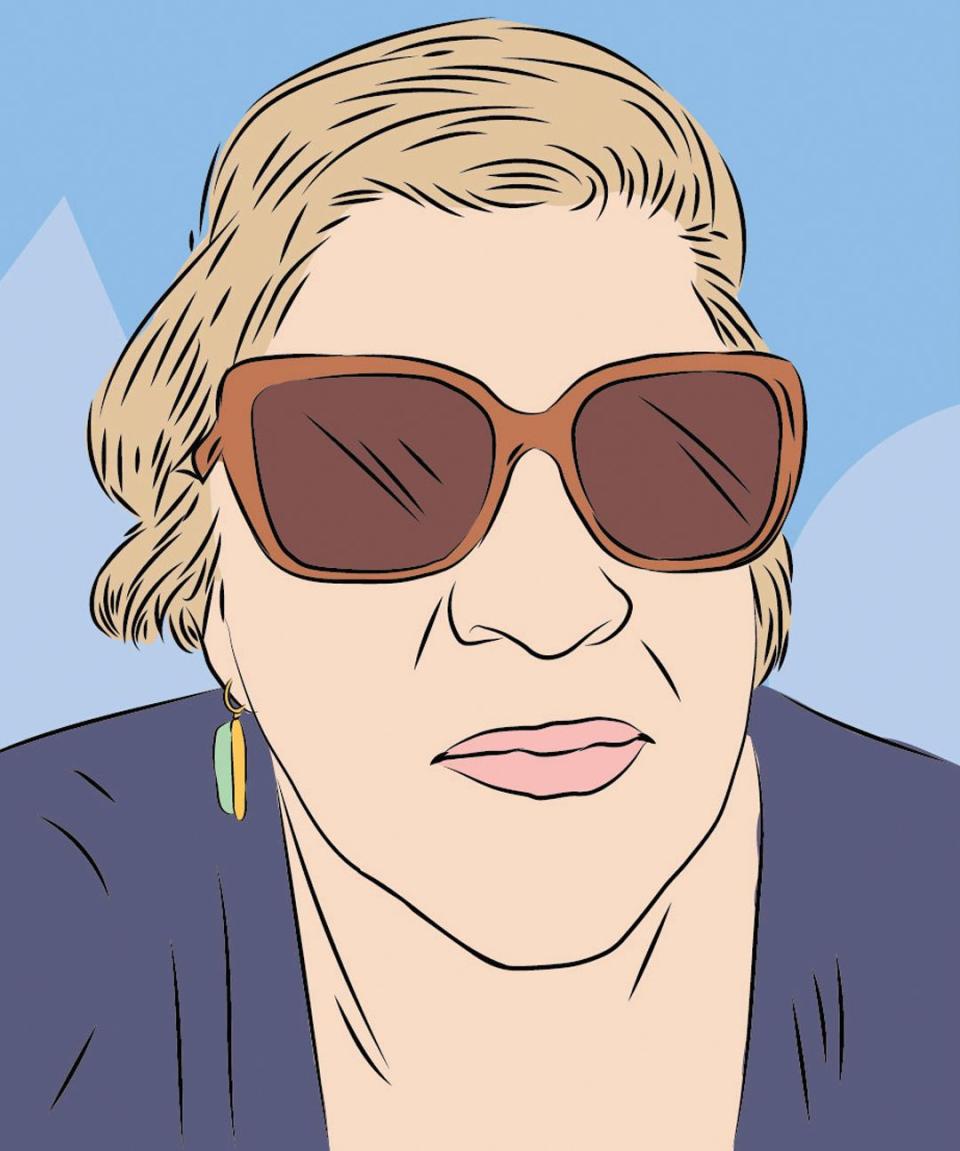
Vicki Rimasse, 67, New Jersey
When Vicki first went to law school at 25, she didn’t have “the bug.” Law school was just a fallback for her, after she got her undergraduate degree in psychology and didn’t know what to do next. She never took the bar exam, instead embarking on a career in legal writing and doing a stint as a receptionist. But now, at 67, a chance encounter in an elevator led to a new job and a promotion to paralegal — and a new hunger for the profession.
“I met a young woman in the elevator and I was impressed with her outfit, because no one had been dressing up since the pandemic started,” Vicki recounted. “I complimented her and said, ‘Oh, by the way, do you need any paralegals at your firm?’ Long story short, by the end of the ride, she wanted me to interview.” In her new role, Vicki fell in love with the law.
“My job feels like watching Dateline sometimes,” she said. “When I was reading deposition transcripts my boss had done, it felt like a chess game. He was so sharp; he would find little nuances. I said, ‘I really want to do this.’”
For Vicki, taking the bar exam feels like a big step, but an exciting one. In anticipation of her career pivot, Vicki also joined Toastmasters to work on her public speaking skills and plans to take the bar exam in January 2023.
What pushed you to make this change? I was inspired by my boss, who was unlike any attorney I had ever known. I had worked in law firms in a support capacity for most of my life, but didn't really have the motivation to take the bar and practice law before then.
What did you learn? I learned that the adage "it's never too late" was true. By pushing myself to do more rather than less in what should have been my retirement years, I felt revitalized.
Do you have any regrets? Though I try not to regret the past, I do sometimes wish I had been more motivated at a younger age. It took me a lifetime to find myself, and it's still a process.
What was the most challenging part of making a change? Fear of failure. What if I don't pass the bar exam? What if I'm really not cut out to practice law? There are always what-ifs when it comes to change. However, much of life is a do-over.
What was the most rewarding part of making the change? I'm happy to know that you can learn a lot working at law firms even in a support staff capacity. So in some ways I never really gave up the dream.
"I started therapy — and a podcast."

Louise Rumball, 32, United Kingdom
When Louise's live-in boyfriend broke up with her over the phone early in the pandemic and never spoke to her again, it sent her into a tailspin. At 32, she was heartbroken and lonely, having moved back in with her parents and unable to cope by going to the gym and seeing friends as she normally would. On top of that, she was struggling with chronic pain and seeing her friends have babies when she felt stuck in her own life. She decided to seek therapy for the first time, and found it transformed not only her outlook on the relationship, but her mental and physical health as well.
“Without the breakup hurting so badly, I wouldn't have gone to therapy — and without therapy I would not have been able to unravel my life, nor would I have rebuilt a much happier, healthier and more self aware version of myself,” she recounts. Louise found therapy so revolutionary that she started a podcast to stream her own sessions, in an effort to show listeners how helpful it has been for her, firsthand. As part of her new, healthier lifestyle, she’s also brought meat and dairy back into her diet after years as a vegan, which had been partially motivated by her ex-boyfriend’s own dietary habits. Undergoing medical testing revealed a host of dietary deficiencies, many motivated by her diet. “It was at the moment that I knew I had been a 'bad vegan' and hadn't been able to maintain a lifestyle or diet that was conducive to health,” she explained. “My pain also hadn't gotten any better since living as a vegan, so for me it seemed a pretty easy shift to move back to eating meat and dairy.”
What did you learn throughout this process? That heartbreak doesn't last forever, even when it feels like it will never end. That everything is, ultimately, happening for you, instead of to you — even when it doesn't feel like it. That deep emotional changes can be used to your advantage, if you choose to let them make you better, not bitter. That sometimes you will not get answers — and that you have to be ok with that. And that nothing beats a non-vegan pepperoni pizza.
What pushed you to make these changes? Therapy. The natural progression of life. Interested in helping people and helping myself. Knowing something had to change and that it was sink or swim time.
Do you have any regrets, looking back on the process (or as you continue to go through it)? I have no regrets. I just wish I had started therapy sooner (and maybe never moved in with my boyfriend in the first place).
"I moved across the country and finally paid attention to my mental health."
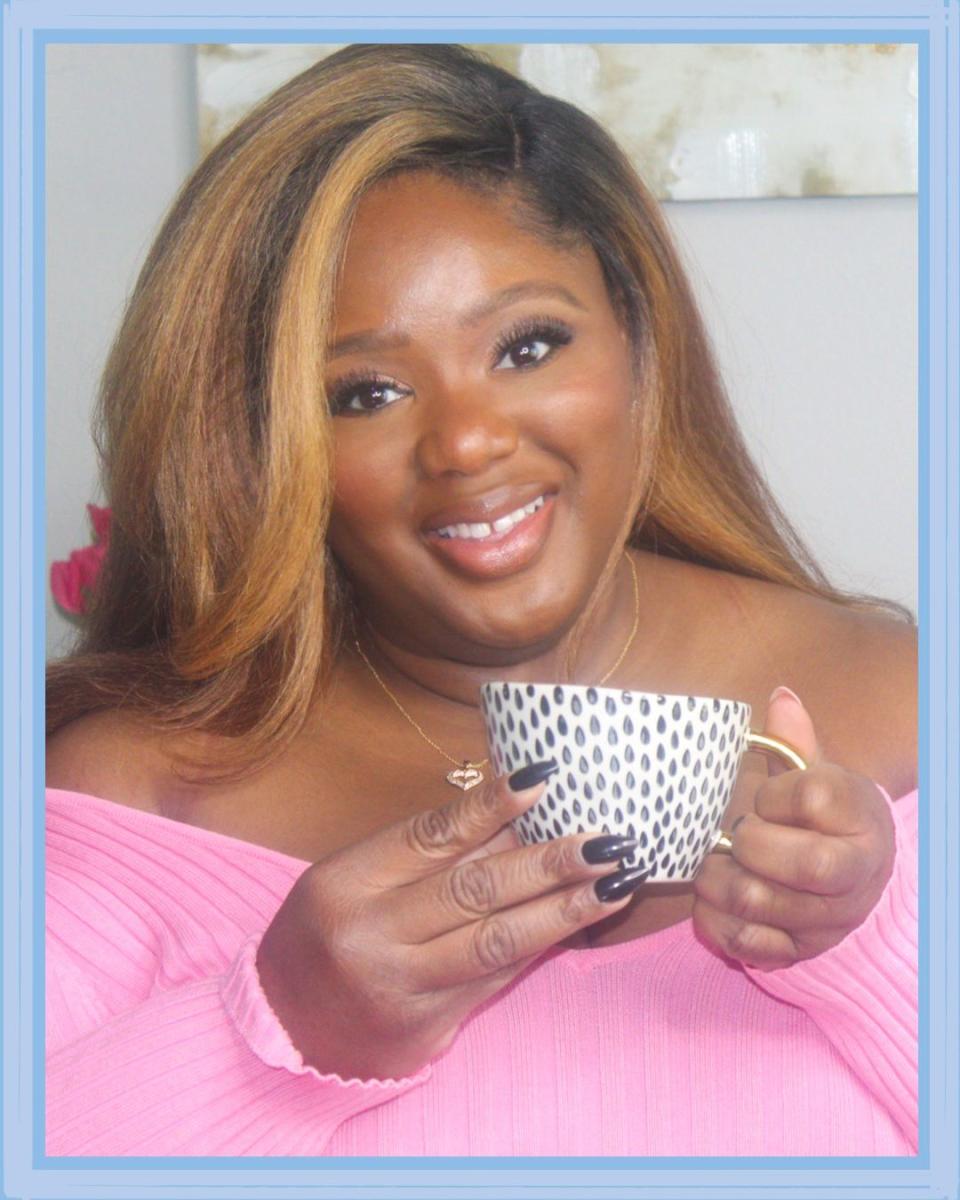
Christian Sismone, 33, Minneapolis
At the beginning of 2020, Christian completed a cross-country move from Texas to Minnesota and thought she would get to start her life over — and kick off her 30s — in a new state. “But the pandemic hit right as I was getting over the initial culture shock of trading my flip-flops for snow boots,” she said. Under the stress of pandemic isolation far from family and friends, with Black Lives Matter protests roiling in Minneapolis, Christian found her mental health slipping. She found a therapist who confirmed she is neurodiverse, meaning her brain functions differently than "neurotypical" people, and helped Christian realize that living as her authentic self can be freeing.
When she was laid off at the end of 2020, she was actually relieved to get to put her learnings into practice. “On the one hand, I was happy to no longer disrespect myself for rent money, but also, like many others who aren't born of privilege, I needed income,” she explained. She spent the first four months of 2021 looking for a new job that allowed her to bring her entire self to work. Today, Christian is working for a company that doesn’t just respect who she is, but celebrates her for it. She called the experience, “like a freshly squeezed lemonade on the first day of summer. I’m free to own my full power versus having to manage hiding parts of me that were too much for the world. I’m finding people can now truly understand the brilliance that is me.”
What was the most challenging part of making this change? Facing myself, and acknowledging how I was living wasn't working. For much of my life, I have tried to contort myself to be what society would deem acceptable. Even I began to believe that I was fundamentally broken and needed to try harder to be like everyone else. Acknowledging that I was part of my own suffering by continuing to perpetuate certain behaviors was hard.
What was the most rewarding part of making this change? Seeing myself be truly me and not hiding was beautiful. I knew inside that I was a gem, but it is different when you actually walk the walk. By being me, I was able to light others to do the same. Taking ownership no matter the possible social risk was freeing.
What did you learn throughout this process? I learned that in my path of surviving I allowed myself to be unwatered. I had to accept my part in the process, because not addressing bad behavior and not calling out what wasn’t working or never worked was part of my struggle. It has provided me even deeper insight into how to navigate the uncomfortable. My life motto has always been “be comfortable with the uncomfortable.” However, I had allowed myself to normalize the abnormal.
What pushed you to make the change? As a first-generation of many things in this life, I have always wanted to be someone who was well put-together. Not having any family of origin, I felt I fought too hard in my life to overcome poverty, and substance abuse-riddled family to not get to live life as vibrantly as I am. In a lot of ways, the pandemic helped me to feel safe enough to face the elephant in the room that was my life.
Do you have any regrets, looking back on the process? My only regret was not doing things sooner but I believe it was the perfect storm by being inside safe from the world for once in my life. I also regret not having gotten help sooner but again I understand the system of being able to value one’s health isn’t in the normal system for those like me in the working class. As much as was lost in the pandemic, I gained so much.
"I faced my demons and got sober."
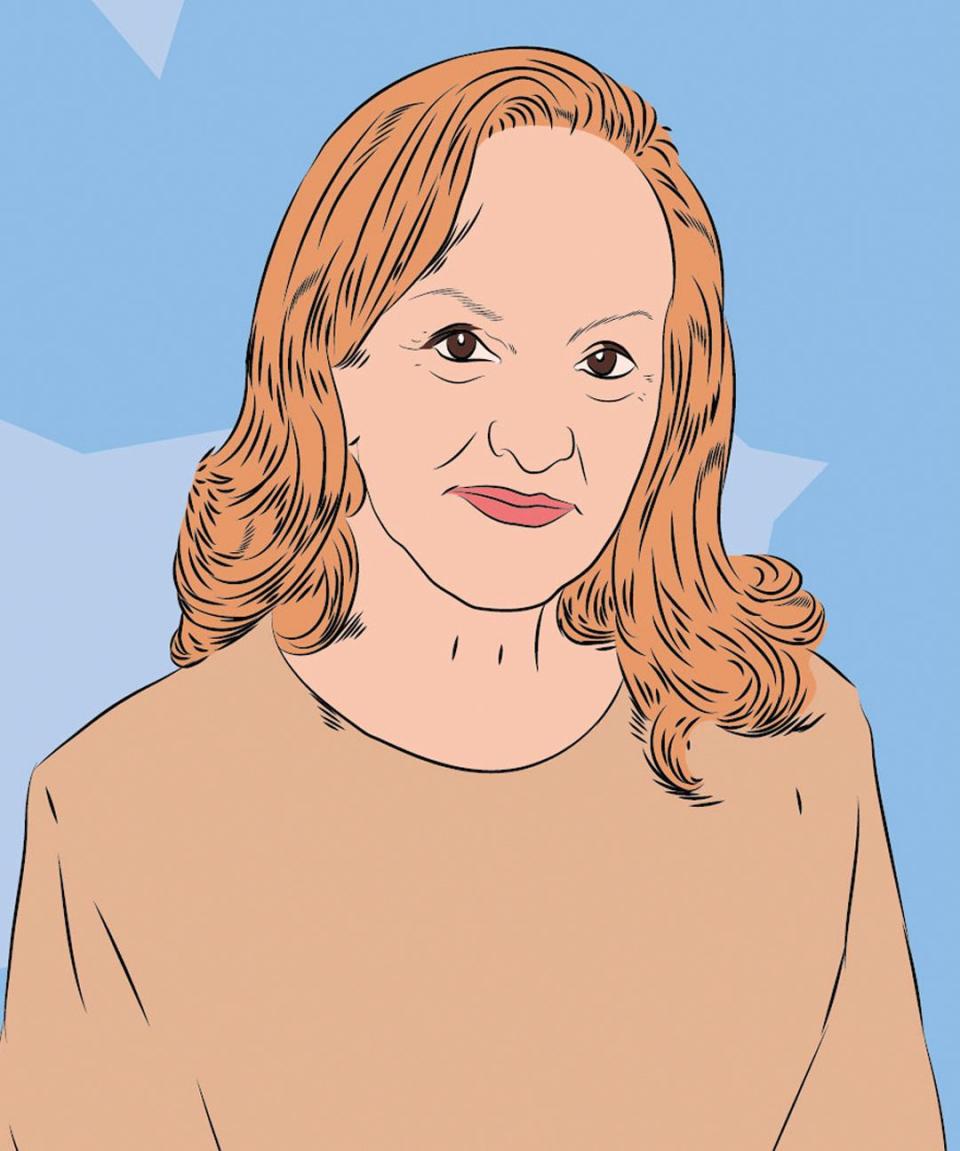
Carina Urbach, Philadelphia
From the outside, Carina Urbach’s life looked pretty great. She had a husband of 24 years, two healthy kids, a job and a vibrant social life. But on the inside, she was miserable. She turned to drinking to mask that misery. “I had really lost my sense of purpose and what was I here to do,” she explained. “I had it all, but my soul was empty.” She stopped drinking the January before the pandemic hit, but once the shutdown happened in March, her daughter came home from college and every distraction dried up, it wasn’t long before she was stealing her daughter’s raspberry vodka. After her daughter confronted her, Carina decided to get treatment at Caron Treatment Centers, where she spent six weeks learning how to live without substances.
“Treatment feels like it was this weird combination of sleepaway camp and boot camp with this movie playing all of your worst memories,” Carina said. But she saw that time as a gift she was privileged enough to be able to access and have health insurance help her afford. “Having that time away from my family to just focus on myself, without responsibilities, allowed me to do a lot of work on myself in a short amount of time,” she said. It taught her how to get in touch with what she really wanted in life and gave her practical strategies for living and a new direction in her career. Now almost two years sober, Carina is embarking on the second year of a master’s program in social work, with the eventual goal of doing the kind of practical, action-based therapy that helped her. “I'm not absolutely sure that I want to be in the substance abuse field, but I think I do,” she said, noting she can use her own experience to help others.
What pushed you to make this change? I first told my family I had a drinking problem on Christmas Eve 2019. By January 1, 2020, I had decided I was going to stop drinking. My daughter was very concerned about me going away to treatment, how was she going to survive without me. My husband said to support me, he wasn’t going to drink either. I was dry until March 12, the day the shutdown happened in Pennsylvania. It got to where one morning, my daughter basically said, “What is wrong with you?” The next day, I was at Caron.
What did you learn? The biggest thing I learned is that I am not what people think of me. I’ve always been the peacekeeper, always trying to keep everybody happy. And I see that very much in all aspects of my life really. And part of the result of that is never doing anything, even if it's true for me, that might upset somebody else. In large part where I am in my sobriety right now is thinking about a lot of that kind of stuff. How do I want to spend my free time, and what do I like to do?
What was the most challenging part? One thing that’s hard is it has changed some of my relationships, because drinking was a big part of them. And that's been sad; I've had to grieve and sort of let go of romanticized versions of things, from how I remember high school to what it was like to go to a great dinner with my husband with a really nice bottle of wine. There is a loss that is associated for me.
Do you have any regrets? No regrets, no. Some surprises, but no regrets.
What’s something that’s been rewarding? As I've been in recovery longer, I’ve found more and more people who are in my circle, or whom I meet, who are also in recovery or choose not to drink. And when you're not looking for something, you often don't find it, but when you start looking for something, it's like you see it all over the place. So that's been a really nice surprise.
“I put my entrepreneurial spirit to work by opening my own business.”
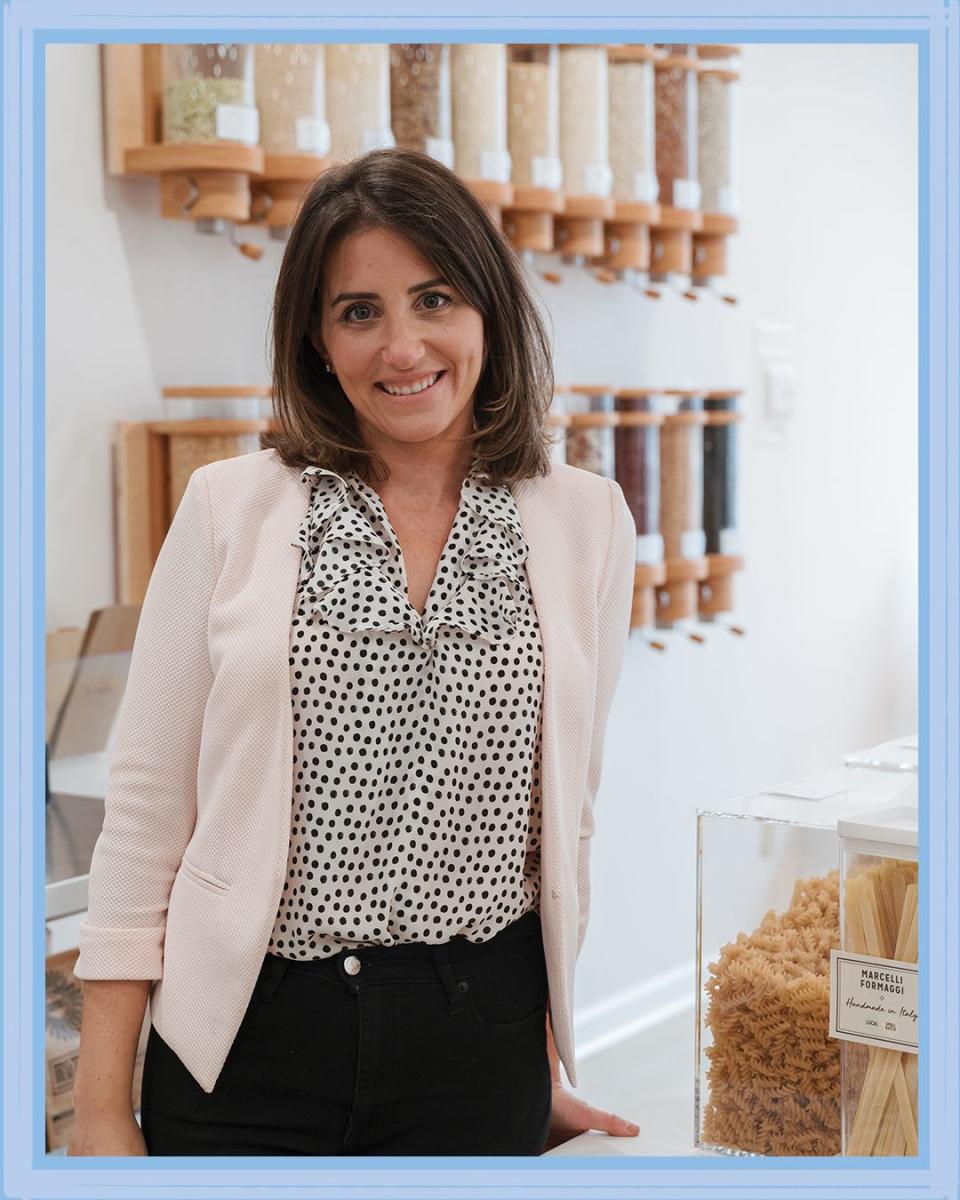
Rachel Garcia, 37, Montclair, New Jersey
Meal kits. Applesauce pouches. Prepackaged everything. The waste she generated just to feed her family appalled Rachel Garcia. “Why am I creating so much trash when I'm trying to do what's best for my kids?” the mother of two wondered. Determined to help make sustainable living easier for people in her community — especially busy parents! — the former retail buyer for Lord & Taylor opened Dry Goods Refillery, a zero-waste, package-free grocery, in February 2020. With a successful crowdfunding campaign, she upsized to a bigger space just one year later.
What pushed you to make this change? I always had an entrepreneurial spirit, but didn't really know where to put it. What made me ready to commit was the opportunity to rent a small space in a cooperative. We could test our idea while sharing overhead and liability with other businesses. I remember sitting on the couch with my husband and being like, “Are we doing this? Because this is the best chance we have to try this.”
What did you learn? Opening this kind of business is a huge undertaking. I didn't know what I was doing at first, even when it came to simple things like, “Which bins do you scoop out of? What’s the process when somebody brings in their own container?” Yet I've learned that I am probably more passionate about this work than I ever thought I could be. It's really opened up this whole can of like, “Wow, I'm really into sustainability.” Now I'm feeling like I want to do even more.
Any regrets? I miss that I used to have more flexibility. My husband can work remotely from anywhere, so this entire pandemic we could have been living in France! Instead, I was like, “I'm gonna go back to the store and pack orders.” But, I still feel like it's the right decision. There will be other times in life to be flexible. Right now, what I'm doing is meaningful for me and hopefully a lot of other people. And that feels really good.
"I started my own wine tasting business, and found my passion."
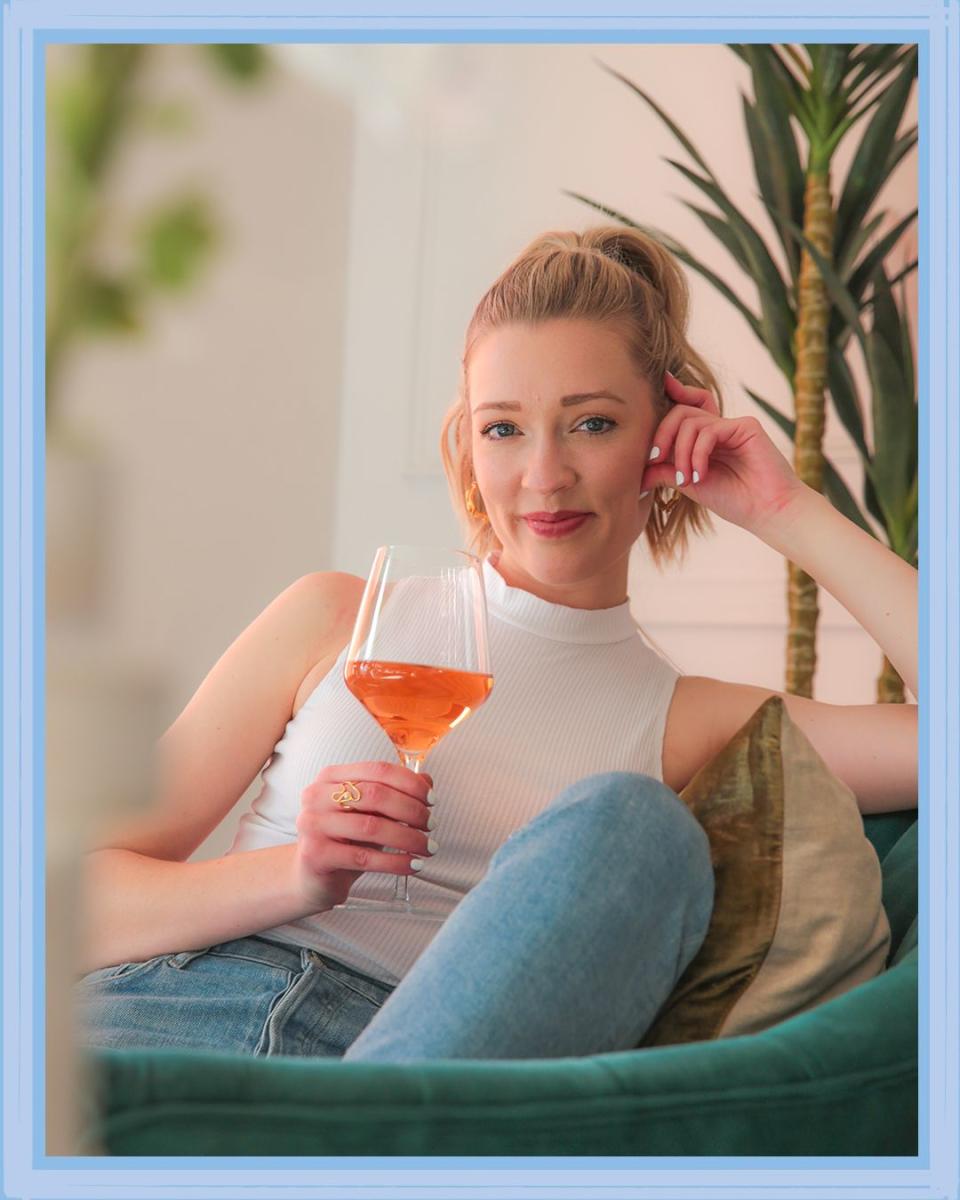
Lexi Stephens, Los Angeles, CA
When the pandemic shutdown hit LA, Lexi Stephens was just a week into a new job as an on-premise wine sales representative, selling wine wholesale to restaurants. Her company shuffled things around to keep her on the payroll, but she didn’t have a lot to fill her time in those early days. She already had a wine blog that she’d started in 2019, Lexi’s Wine List, so she decided to spend her free time working on that. When she decided to share her wine knowledge with friends and family by hosting free virtual tastings, the response was overwhelmingly positive. After posting about it on social media, the business took off. “I was connecting with people all over the country, Canada and the Philippines,” she said. “And ultimately, I ended up finding my passion in wine education.”
Lexi quit her job to focus on tastings full-time in January 2021. While it was scary at first, she loves teaching people how to drink wine, whether they have a full cellar at home or need help decoding their local wine shop’s shelves. “My tastings are a little bit different, because they're all about teaching people how to taste wine,” she explains. “My goal is to break them out of their wine comfort zone and give them that vocabulary and skills that they need so that next time they go to a restaurant, they can let the server know that they can try something new.” Even with bars and restaurants back open, Lexi’s Wine List is still going strong, with everything from corporate clients hosting virtual tastings for remote teams across the country to friend groups contracting her for a birthday party.
What pushed you to make the change? It got to the point where I was just kind of working two full two full-time jobs at once, essentially, because my side hustle really became a full time job. My fiancé and my mom and everybody just kept asking me, “Why don’t you just quit your job?” But it was really scary. When I first did it, I was terrified and also relieved and excited. It's so cool to be able to work for myself and make my own decisions every day and feel like I'm actually devoting all my energy to growing something that really matters to me.
What’s been the biggest challenge? I really struggled with impostor syndrome at first, and I was just too nervous to really go for it. As a woman in the wine industry, we’re already faced with so many issues because it's still a male dominated industry. So that made it a little bit more nerve-wracking.
What have you learned? I feel like I really found my passion. I fell in love with wine six years ago; I knew that's what I wanted to do. But teaching normal people about wine has been so fulfilling for me. I kind of found a teacher within myself, which I never really knew before. The best piece of advice anyone ever gave me was to know your worth. I think when you start a business, it's so easy to be like, “Oh, but I'm brand new, so I probably shouldn't charge for this” or “I'm just starting out so they probably don't want to pay for this,” and that's not true at all. I think you should be paid for your work and it ultimately will have people respect you more.
Do you have any regrets? I’m not a person who regrets things, but the only thing I would change is just telling myself that, you know, it's going to be okay. And starting a little bit earlier. Just going for it and starting before you're ready, I think, is really important.
"I ran for office — and won."
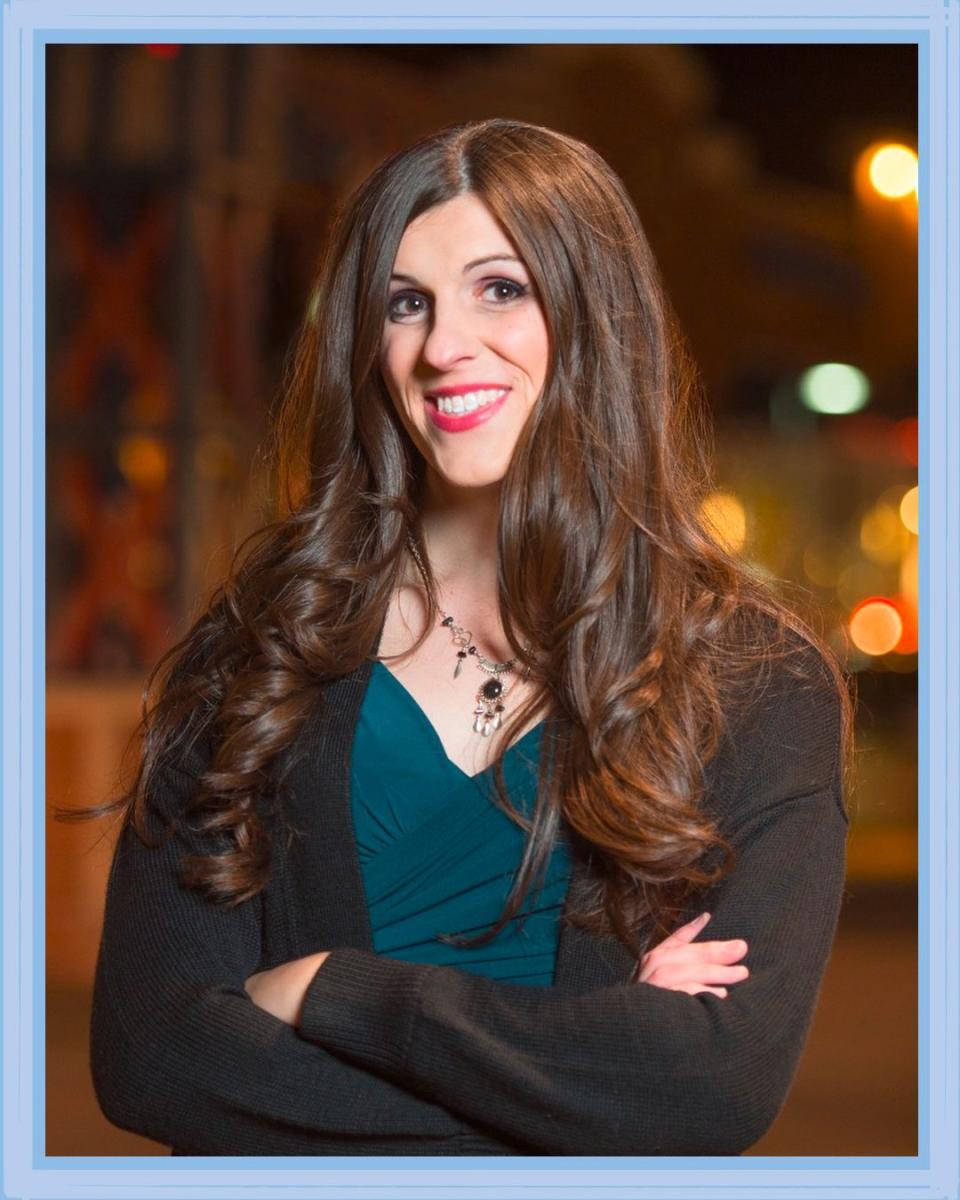
Danica Roem, 37, Manassas, VA
“When you launch a campaign for a state legislative office as an uninsured, unemployed transgender metalhead reporter, vegetarian and stepmom, that means that you have not entered the realm of politics from central casting,” says Danica Roem, a Virginia state delegate and the first openly transgender state legislator. “It means that you have a lot of experiences of all sorts to bring to the table.” As a former journalist and metal band lead singer who’s now running for state senate, Danica has reimagined herself several times in her life, from transitioning to her true gender in 2012 to her more recent career change. She recently wrote a book about it all, Burn the Page: A True Story of Torching Doubts, Blazing Trails, and Igniting Change.
Danica says her experiences give her a unique level of empathy with her constituents. “I know what it's like to be singled out and stigmatized because of who you are. Instead of being welcomed, celebrated, respected and protected because of who you are,” she says. Owning her own narrative and letting go of what doesn’t serve her has helped keep her focused on her work and away from those who disagree with her policy or dislike her for who she is. “Just because someone bothers you, gets under your skin or whatever, you can't let them see you sweat,” she says. “If you talk down to them, you don't actually get your point across to them. You just make them become bitter toward you, because they feel disrespected.”
What pushed you to make the change? Even though not everyone is going to be able to relate to every single part of who you are, you can at least be in a position where you can relate to a lot of people on at least something that you might have in common with them. Especially when you know what it's like to struggle and what it's like to have to overcome obstacles that were put up in your place that were designed for you to fail. So for me, rewriting that narrative was about owning my narrative. It was about going from being a closet case, who was too afraid to be authentic, too afraid of what other people might think, to now being in a position where a lot of people come to me to ask what I think about something. And it's not that you do any of this because you have a supernatural craving and lust for power. You do it because you know what it's like to be left behind. All of that requires setting fire to the stories you don't want to be in anymore.
What has been your biggest challenge? The biggest challenge in transitioning was confronting my fear of disappointing my mom, wondering how my guy friends would react to me, because the women in my life tended to be pretty cool about it. But I was very worried about how my male friends were going to react. In my political career, I was working as a part-time news editor and a weekend delivery driver when I launched my campaign. I felt like where I was supposed to be versus where I landed are not compatible with each other. Before transition, I was getting interviews every two or three applications. But after, I was averaging one in 36. When you graduate college, you have a BA, you’ve got more than 10 years of news writing experience, you’re left wondering what the hell happened? Well, what happened was I'm now living life as a woman.
What have you learned? You have to really sit down and listen to people because if you assume that a policy position you have is inherently good for that whole community, you can be surprised when you get negative feedback from the very people you're trying to help in the first place. I found that out the hard way. You’ve got to be respectful, and even toward people who aren't always kind. When your job is to represent 100,000 people, you have to understand that there are several thousand of them who fundamentally will disagree with you, no matter what you do. And so just the best thing that you can do, at that point, is just not give them a reason to hate your guts.
Do you have any regrets? I've taken the things I do regret and I've been using them as learning experiences. My biggest regret is learning to pick my battles, realize when you're in a power position, other people aren't and vice versa as well. Pick your battles. It's not necessarily that you're going to lose a fight, but that when you spend the time doing that, you're not engaged in other things that matter more.
"I changed careers — and finally had time to pursue what really matters to me."
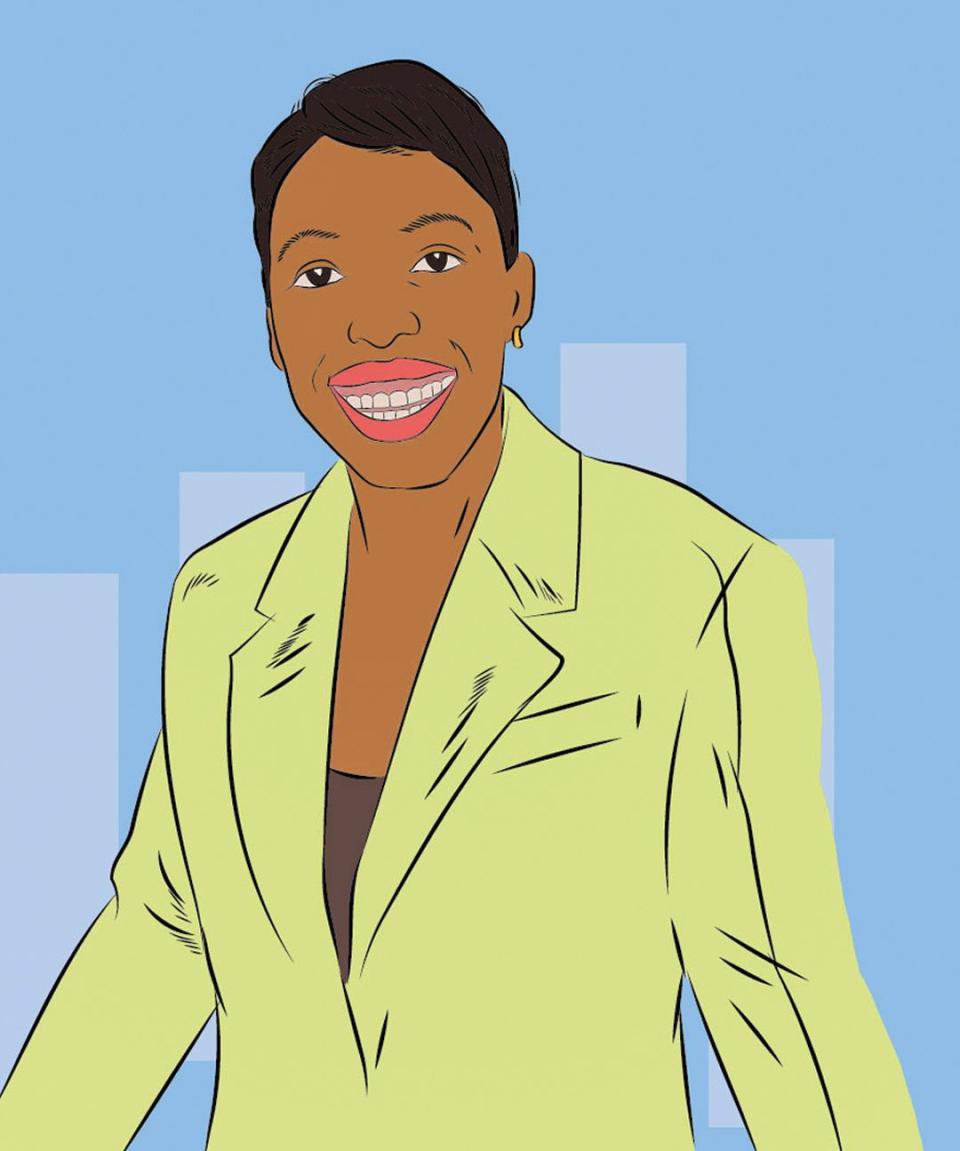
Candi Carter, 53, New Jersey
After 30 years as a TV producer, Candi Carter had an epiphany once her team was forced to work from home early in the pandemic. “I work with a lot of Millennials and members of Gen Z, and they’re always talking about 'me-time' and 'work-life balance.' But I’m 53, and as I was growing up, we were never allowed to focus on that,” she explained. Suddenly she could be home for dinner instead of not making it back until her kids' bedtimes. Once she saw what was possible for her without working 16-hour days, seven days a week, she also realized that her decades of experience could be used more strategically elsewhere.
Candi took four months to see what else was available before landing at Knocking, an e-commerce production company, as chief content officer. In her new role, she’s able to embrace opportunities that come her way and live in the fullness of her own creativity. “I can run my foundation, share philanthropic goals and sell TV shows, and the C suite at Knocking is encouraging and excited for me to do all that,” she explains. “I can get out there and pursue what really matters to me, and it’s such a freeing life proposition to be able to do that. I could not be happier.”
What pushed you to make a change? I knew I didn’t want to be a producer for the rest of my life. Change is never a bad thing. Every year for the past decade or so, I’ve started off by setting one personal and one professional goal to focus on. This is this year’s realization of that.
What have you learned? I’m learning every day. E-commerce is the future of commerce, the future of shopping, at the forefront of how so many media businesses operate. Being in this new arena of business has shown me what’s really possible. It’s a tremendous opportunity.
What has been the biggest challenge? I had four months between leaving my last job and beginning this one to just breathe and see what other opportunities might come into my space. It takes a month for people to realize you’re available and another couple of weeks to set meetings, so these things really do take time.
Do you have regrets? I don’t have any regrets. Now I get to walk my daughter to the school bus. It’d been years since I'd done that, because I was always on a train when she was headed to school. Not anymore.
“I gave up drinking and changed my life.”
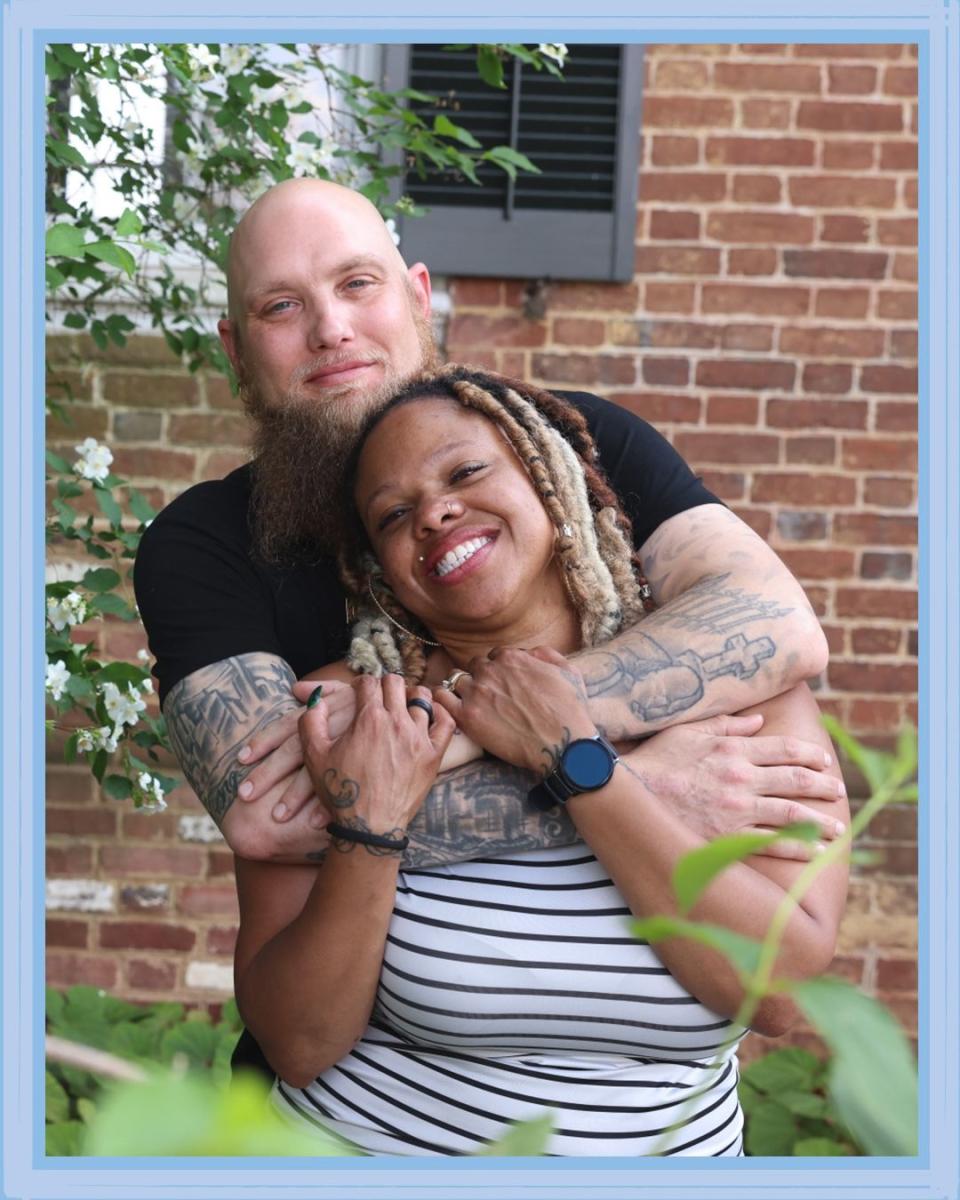
Chad Osinga, 40, Spotsylvania, Virginia
A motorcycle accident in 2018 left retired Army sniper Chad Osinga drowning his pain in a nightly fifth of whiskey. No sooner had he mustered the courage to climb back on his bike in June 2020 than a minivan going 65 mph veered into him on the freeway. His pelvis, hip, femur and neck were broken. “No one thought I was going to live, even the doctors,” Chad says. Lying alone in his hospital room, the father of four had an awakening that made him quit drinking and conjure a new path for his life.
What pushed you to make this change? I realized that for whatever reason, God had a plan, and it was way bigger than me. I've faced a lot of life-and-death situations, and to still be standing showed me that I needed to stop feeling sorry for myself, be grateful for the life that I had, and start taking action toward the purpose that I believed I had.
What did you learn? I accepted the fact that I was using drinking as a crutch so I didn't have to deal with some of the things that I've been through in my life, whether it be the wreck, my traumatic childhood or my life in the military. I wanted to remove those crutches so I could be a better version of me. When you start walking in your purpose, other things become less important to you.
Any regrets? I was an angry person before. I had a lot of demons. When I was drinking, I would often say mean things to my wife. I was not present for my family, including my three special needs kids. Now my wife and I have a better relationship than we've ever had in the 24 years that we've been together. My whole family has come so far. I was the problem, and I was also the cure.
“I used my business acumen to find a husband.”
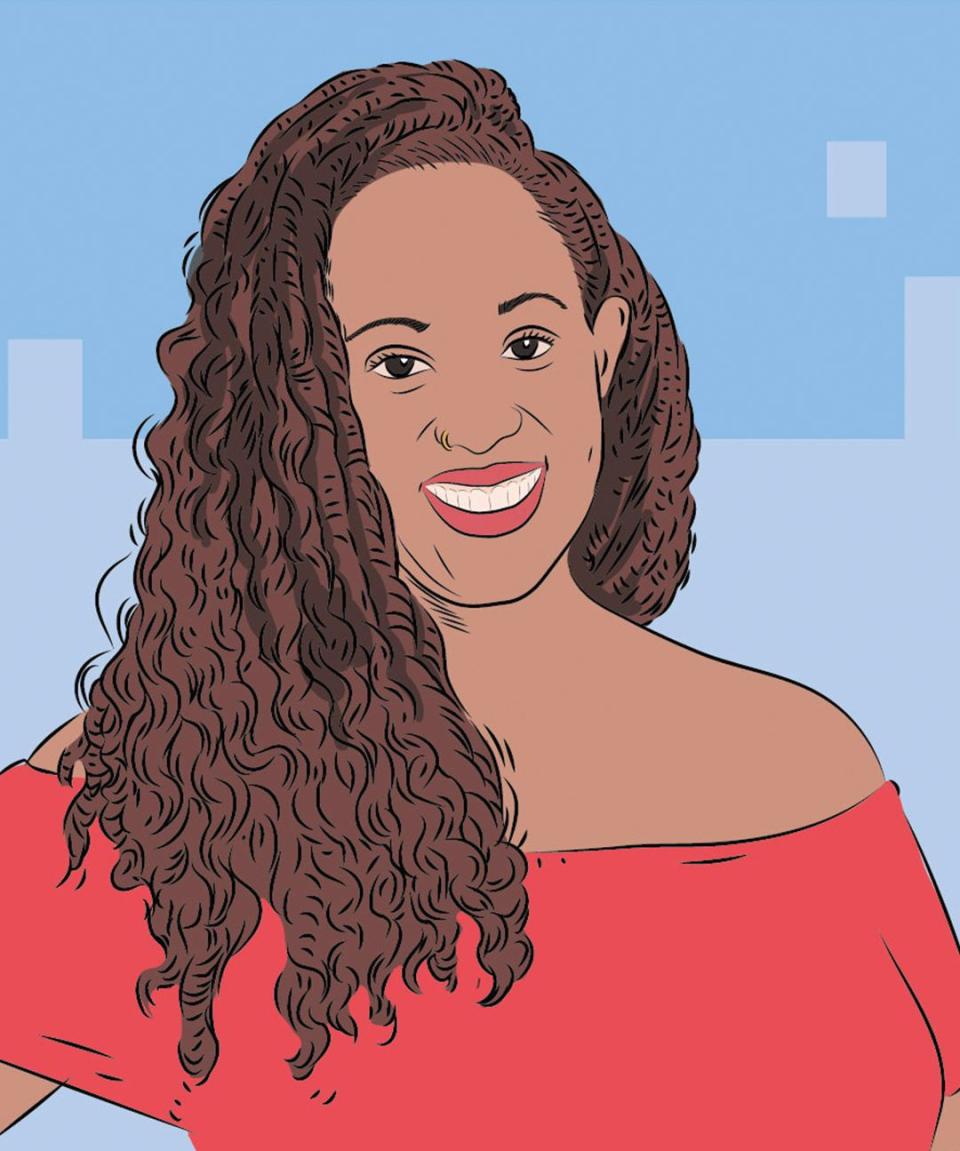
Tomika Anderson, 46, Woodbridge, Virginia
During COVID, project manager Tomika Anderson decided it was time to project-manage her way into marriage. “The pandemic gave me the time to be more strategic around how to navigate online dating and get to know people,” says the single mom of a 9-year-old. “I really did it like a job.” Her hard work — sometimes she’d go on four dates in a weekend — paid off when she matched with a single dad named Michael in February 2021. Now they’re planning their wedding in Turks and Caicos.
What pushed you to make this change? I had kind of flirted with online dating off and on over the years, but during COVID I was like, “Let me develop a system to apply some of the same standards that I have for my work and my teams to my dating.” With Bumble prospects, I would message them, then have a phone call, then a Facetime call, then we’d schedule a date.
What did you learn? To be clear. On our first date, I told Michael exactly what I was looking for, basically seeing if I had to weed him out. I said, “I don't want to leave this area. I want someone who's not a stranger to therapy. I have a travel business, so I need to be with someone who's going to be able to do that with me. And I want to be married.” And he’s like, “Check, check, check, check.”
Any regrets? I used to tell myself things like, “Who are you to strive for that?” I had to become a better steward of my mindset so that I didn't count myself out for the things I most wanted in life. A lot of people would have given up at 45 on finding the love of their life, but I am the happiest I've been, and it's largely because I didn't give up.
“I experienced a faith transition.”
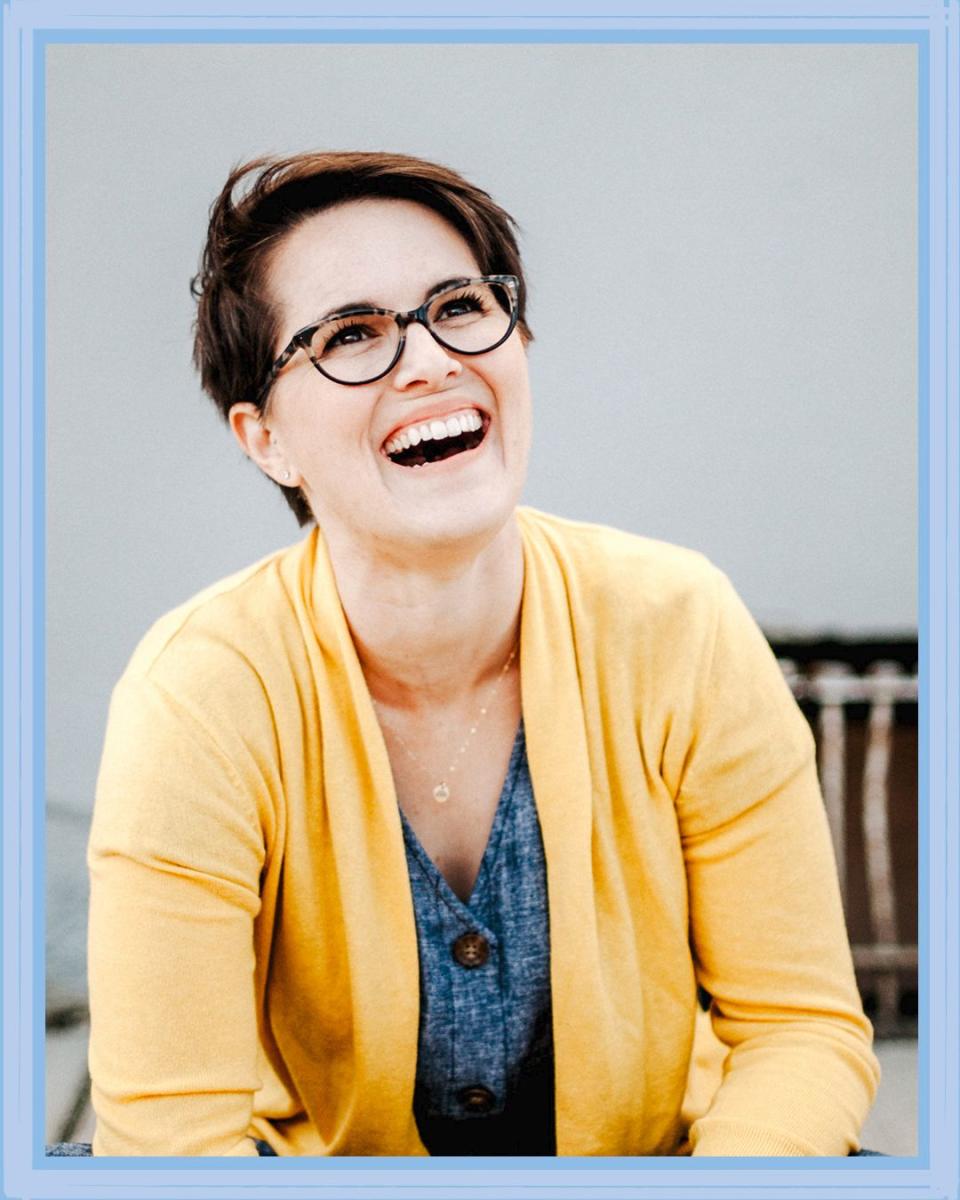
Morgan Motsinger, 38, Tillamook, Oregon
As her 14-year-old daughter Annika lost her speech and mobility to a rare and fatal genetic disease, interior designer Morgan Motsinger began to question long-held beliefs. Eventually she left her lifelong evangelical faith behind. “I'm still learning and growing and experiencing joy and peace in what I am pursuing,” she says. “That is what has given me the courage to really understand that each person's spiritual journey is their own. You can't abdicate that to anybody else.”
What pushed you to make this change? Growing up in a very conservative religious household, I was told that anything outside of what I believed was off limits and dangerous. But I found that I was ill equipped to deal with some of the deep heartache that came with having a child with a terminal diagnosis. I started exploring my own beliefs — and began to have some inkling that I had more autonomy over what I believed than I thought I did.
What did you learn? I had this idea that I was supposed to be the sacrificial mother, so I neglected myself for a long time. Figuring out how to really care for myself and love myself was a big part of my faith transition. I deserve to feel good, so meditation has been huge for me. Now I try to be really, truly present, like when I’ve got Annika on my lap. I just take a breath, smell her hair, and pay attention to how, in the light, it looks like her hair has strands of gold in it. I can't help but be so grateful in those moments.
Any regrets? It's only been in the last six months that I have been more open about leaving my faith tradition. People have told me, “Satan's deceiving you.” For a while there, it stirred up a lot of fear for me. But as I’ve been more open about saying, “Hey, this is what I've gone through,” I've seen people, women in particular, come out of the woodwork to say, “Oh my gosh, I'm going through that too.” That has helped me feel more brave.
“I quit my teaching job to save my health.”
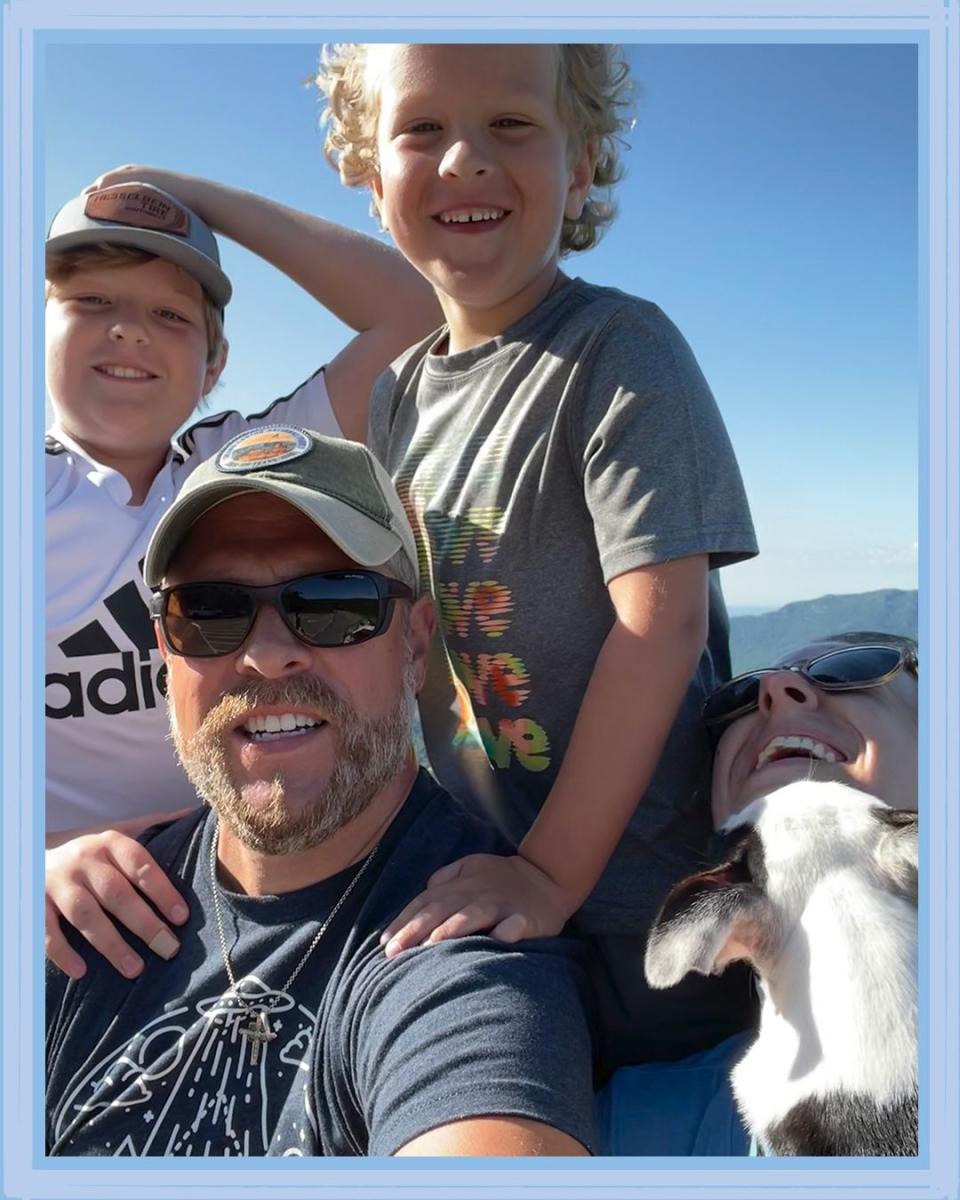
Josh Davis, 41, New Braunfels, Texas
Fifth-grade math teacher Josh Davis’s panic attacks started six months into the pandemic, a product of the stress of hybrid teaching, absentee students and irate parents. He lost weight and began to snap at his 6- and 13-year-old sons. Some mornings he couldn’t get out of bed. “I've always been proud of my ability to withstand pressure, yet I would break down in tears in the shower,” he remembers. In October 2021, he resigned.
What pushed you to make this change? I was doing all sorts of stuff to get better. I tried meditation, a diet change, exercise, breathing techniques, tapping, antidepressants, sleep aids. My therapist said I had to get a new profession, but I didn’t want to. Finally my wife, Heather, told me it was time to leave teaching. She said, “Money is one thing, your health is another.”
What did you learn? A paycheck isn't worth chasing. Being outside and being with my family are the two things that that fill my life up, and I felt like I was losing both, since I never had the energy left at the end of the day to get outside, let alone to play with my boys. Now I work from home creating my website Outdoor Family HQ. We have less money to travel, but just being outside in my own yard, I feel the same kind of release as I did hiking the North Kaibab trail with my 13-year-old son.
Any regrets? Just because you leave the classroom doesn't necessarily mean the classroom leaves you. I worry sick about my students. But because of the way my psychological and emotional health was going, the quality of my instruction was decreasing rapidly. Quitting was a huge leap, but I'm hoping in the end that my sons will see a different way to approach work — that you can have a job that allows you to pursue what you love and to share it with other people.
“I took a corporate job to save my business.”
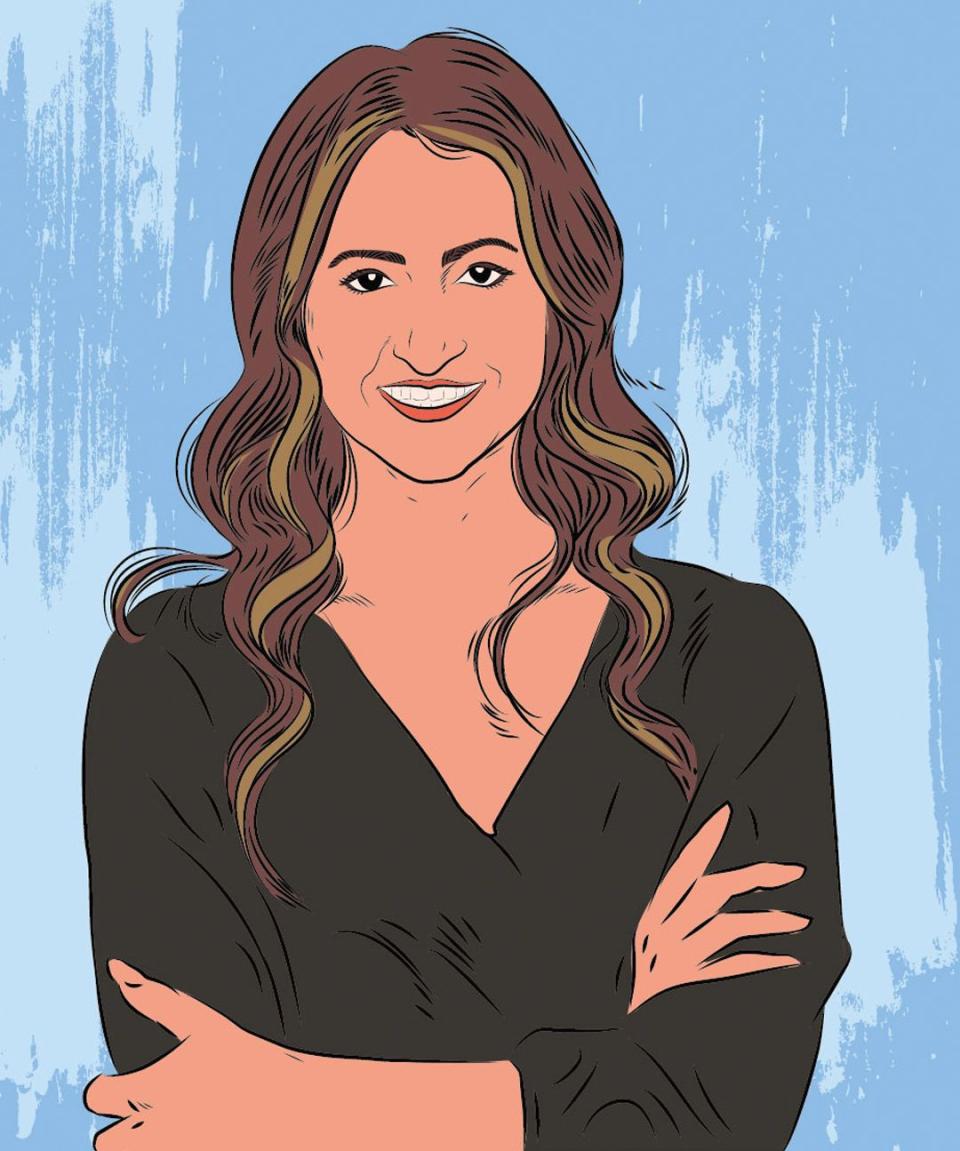
Nicole Fauls, 32, Chicago, Illinois
Prepandemic, Nicole Fauls’s business, Urban Allure Events, put on 150 weddings a year. But in all of 2020, the number was just 12. To avoid laying off her seven employees, Fauls did something unexpected: In October 2020, she took herself off the payroll and took a full-time job with a veterinary company. “I let my team run everything,” she says. The plan worked. Now Urban Allure has more celebrations on the books than ever, and Nicole returned as boss in March 2022.
What pushed you to make this change? I didn't want to let anybody go, because our company is built on relationships with our couples, and we had to reschedule 85 to 90 weddings in a super-short amount of time. But I said, “I can step away.”
What did you learn? Working with a big corporate team taught me new ways of leading and listening to others. While the Type A in me is like, “You do things a certain way,” I’ve learned to allow my team to take on more responsibility. I’ve also learned I don’t want work to dictate who I am. I'm trying to bring that back into the culture of our company as well, giving people unlimited PTO and being mindful of their work-life balance.
Any regrets? I could have been more thoughtful about how to transition smoothly back to my business. But I’m a no regrets kind of person. Looking back on it, I think this decision saved my business and saved me during the pandemic.
"I moved my family out of New York City."

Daphne Oz, 36, Palm Beach, Florida
For nearly a decade, New York City was the center of Emmy Award-winning television host Daphne Oz’s personal and professional life. Using her culinary degree and training in integrative nutrition, she served as a cohost on the daytime talk shows The Chew and The Good Dish, was a featured lifestyle expert on her father’s show, The Dr. Oz Show, and a judge on Fox’s MasterChef Junior. She and her husband John, an energy investor, socialized with a close group of friends from college (the pair met as undergrads at Princeton) and other professionals, basking in the energy and vibrancy of the city.
Then, the pandemic hit and the family — which by then included four kids — moved to Florida. “We wanted our kids to truly live an indoor/outdoor life,” says Daphne. The move isn’t without cons — both parents are frequently on the road, with Daphne traveling to New York regularly for filming — but the family of six takes it in stride. “The pandemic highlighted how much we can’t control,” she says. “But coming home to a place that feels like vacation is a major win.”
What pushed you to make this change? There’s an ease-of-use to the community we live in. I can pick my kids up from school and get them to an activity in the span of 20 minutes. I feel like being in Florida lets me stretch my day and maximize the time just by virtue of how convenient everything is. I am also in love with driving — my trunk is my best friend, I have literally everything I could ever need in there.
There is so much to love about life in a big city, but I grew up getting to be outside at my grandparents’ farm in Pennsylvania most weekends and that experience was formative for me. I want our kids to have plenty of outdoor time to explore and expand their imagination, prioritize play and magic. That independence and adventure brings so much self-discovery and confidence-building in the process.
What did you learn? I learned that my husband and I both really value community. We fell in love with being able to have small town energy – kids on bikes on the street, neighbors who drop in with snacks and wine, weekends that fill up even when you don’t make any plans, running into friends everywhere – and big town amenity. We have beautiful restaurants and culture and history all around us, and we are an hour and fifteen minutes from Miami so we’re there all the time, even just for a quick dinner or night out.
What was the most challenging part of making the change? The hardest part for us was how we went from spending nearly every weekend with family or dear, old friends to living in a different state a thousand miles away. Most of my family lives within 50 miles of each other, and it had been a huge part of our parenting philosophy to raise our kids amidst the chaos and fun and specific culture of a huge family gathered together. So many meals and memories! Luckily, we have had frequent visits to look forward to. I do miss the dynamism of the New York City food scene, it’s always been a huge inspiration for me. I miss the novelty and the happy serendipity of the way a night in the city unfolds and you run into people you love totally by surprise or make a new friend in a crazy way. I do get back frequently though, so I feel like we’ve found a good balance of still feeling connected to that part of our lives. And I love coming home to Florida.
I would say establishing all our new routines as a family was a challenge but a joyful one — we’ve loved creating a whole new slew of meaningful experiences that are unique to us and this time in our lives.
What was the most rewarding part of making the change? It makes me so happy to see our kids thriving — meeting new friends, trying new sports, exploring the farmers market with me on the weekends and eating as many of our meals outside as we possibly can. I am overwhelmed by how prized and meaningful our friendships in Florida have become — it can be challenging to make new friends as an adult, and we got so lucky. But I would say the most rewarding part has been seeing that home is a feeling not a place — to know that we can thrive somewhere new with a new set of pros and cons and live life in full is as energizing as it is stabilizing.
—Reporting by Lizz Schumer and Melody Warnick
More on the Great Reimagination
You Might Also Like